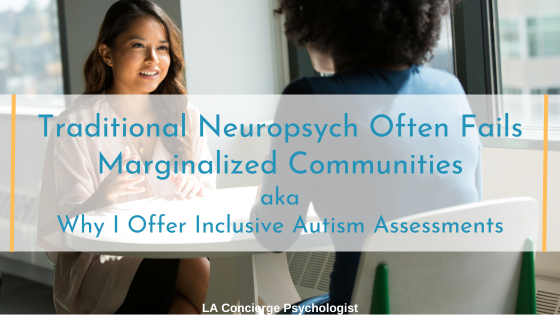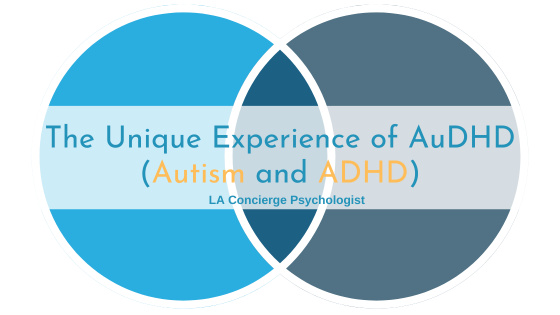So many neurodivergent people try therapy and end up stopping. This isn’t because they don’t want to do the work; this is because therapy betrayed them. Many find their experience with their therapist unfulfilling at best and traumatizing at worst. Therapy, where they were supposed to feel safe and accepted, became a place of invalidation and judgment.
Why is Neurodivergent-Affirming Care so Important?
A therapist’s first goal with any client is to build a connection—a therapeutic relationship so that there’s mutual trust between both parties. If this therapeutic relationship never forms, then it’s difficult to make any progress. When a neurodivergent person gets connected with a therapist who doesn’t understand or practice neurodivergent-affirming care, the chances that critical relationship will ever form drastically diminishes.
Neurodivergent people very often have trauma from living life in a society which neither accommodates or understands them. So when their therapist’s office feels like the rest of the world, unsupportive and uninformed, they are unlikely to let themselves be vulnerable with that therapist. Without that vulnerability, progress is slow or non-existent.
But there are solutions to this problem. Finding a therapist who is neurodivergent-affirming can be a transformative choice. A therapist who makes neurodiversity part of their therapeutic model has a unique outlook on the brain. They understand that different neurotypes naturally occur and are not “disordered” with the need for a cure. They’ve taken the time to sift through the myths and untruths that still plague the medical world and ditched the medical model of disability. They build their practice on a foundation of acceptance. They work with your neurology, not against it. The neurodivergent experience is important, and they are ready to validate it and use it in their practice.
How To Identify A Neurodivergent-Affirming Therapist
Some affirming therapists will have their stance on neurodiversity written out on their site. This means they are likely affirming. Though, make sure the rest of the site backs up that statement. Some therapists use “neurodiversity” as a buzz word but don’t actually have neurodivergent-affirming practices. Words like ‘neurodiversity’ and ‘support’ signal likely affirming practices. Descriptions of their therapeutic approach that reference pushing against ableism, understanding the double-empathy problem, and similar concepts are positive signs of neurodivergent-affirming practices.
Start being cautious if you see too much talk about changing behaviors. This holds true whether ‘affirming’ is on their webpage directly or not. If a site makes any mention of ‘curing’ or ‘getting rid of X behaviors’, these are signs you aren’t in an affirming place. For autistic clients, beware of images of puzzle pieces or mentions of being supportive of Applied Behavioral Analysis (ABA) or Autism Speaks.
Another way you can get confirmation that you’re working with an affirming therapist is if they mention they have lived experience with any kind of neurodivergence. This one isn’t as easy to find; some clinicians don’t disclose this online. Sadly, because ableist attitudes are still pervasive in the mental health field, many neurodivergent clinicians don’t feel comfortable being “out” in their professional role. However, a neurodivergent therapist may talk about it in the first session or later on in your work together. These therapists intimately understand the struggles and societal shame that can come with neurodivergence. They will be allies in helping you become the person you want without sacrificing yourself. If having a therapist with lived experience is important to you, and you’re not sure whether they have that, it’s okay to inform them that it’s important. Though it’s still their choice whether to disclose.
Benefits of Neurodivergent-Affirming Care
Finding a neurodivergent-affirming therapists can be difficult, but it can also be an amazing experience. Here are some of the major benefits you can expect:
An Increased Sense of Safety
Therapy is an inherently vulnerable process; you are sharing your deepest feelings with a stranger. Having those feelings invalidated or misunderstood simply because someone doesn’t understand your neurotype can be very painful. Working with a therapist who is neurodivergent-affirming can help avoid that kind of harm. They can provide a safe space to talk about challenges particular to your neurodivergence, and those conversations can happen without a fear of judgment.
If neurodiversity is their specialty, it’s likely they have other clients with similar challenges. This means you won’t surprise them. Likely, they’ll normalize your experiences as part of a common neurodivergent experience. They will also have an easier time understanding the judgment which has likely followed you through your life. In turn, they will make an extra effort to make sure you know you are in a judgment-free space where you can speak freely.
Education
We’d all like to work with a therapist who is knowledgeable about what we are going through. A neurodivergent-affirming therapist already has a lot of information and understanding about neurodiversity. They won’t have to start learning about it from scratch when you walk into the office. This means the emotional labor of education isn’t up to you in the therapy room.
If you do need support with something they aren’t as experienced in, a neurodivergent-affirming therapist still won’t put the burden of educating on you. They will already have tools and resources to consult so they can give you the most effective help possible.
This will also be the case with any accommodations you need while you’re in therapy. Some therapy styles are considered generally effective, but they need to be adjusted for neurodivergent clients. When this doesn’t happen, those styles can stall progress or actively cause harm. A therapist who has worked with neurodivergent clients and made an effort to learn their needs will likely already know ways to adapt a particular intervention for your neurotype. And they will be open to adjustments and accommodations if anything still doesn’t feel right.
Acceptance
Safety and education are both critical in a therapeutic relationship. But at the very core of neurodivergent-affirming therapy is the knowledge that who you are and how you think will be validated and supported. A therapist who understands neurodivergence and follows the neurodiversity paradigm will help you be the healthiest version of you. They won’t try to change who you are at your core. Traits and behaviors like hyperfocus, distractibility, differing communication styles, or stimming won’t be pathologized; they will understand that these are a part of who you are, not a symptom to be overcome or get rid of. They will help you learn how to use these traits to support yourself and improve your daily experience.
Your lived experience should be honored in the therapy room; a therapist should never treat it like a problem. An affirming therapist won’t discount or under-value what you bring. Instead they will make it part of the work you do together. In an affirming office, you won’t be a problem to be solved or a behavior to overcome. Your needs will be respected and your perspective will be honored for its value.
Find Neurodivergent-Affirmative Therapeutic Support
It’s important to remember that even a neurodivergent-affirming therapist might not be perfect at everything mentioned in this article. They are human like anyone else and will probably make at least a few mistakes. But the difference that’s important to understand is that they should be more aware of their mistakes and the consequences. They want to support each part of you and will try to do better. By choosing to specifically find a therapist who is neurodivergent-affirming, you are so much more likely to find a safe space to be yourself as you heal and grow.
Here at LA Concierge Psychologist, all of our doctoral-level therapists are firmly committed to providing neurodivergent-affirming therapy for our clients. In particular, we specialize in adult autism and adult ADHD. All our therapists also have experience with anxiety, depression, and trauma. Send us a message to see how we can help, or book a free 20 minute consultation call with Dr. Abbene, Dr. Barajas, or Dr. Goldman.



